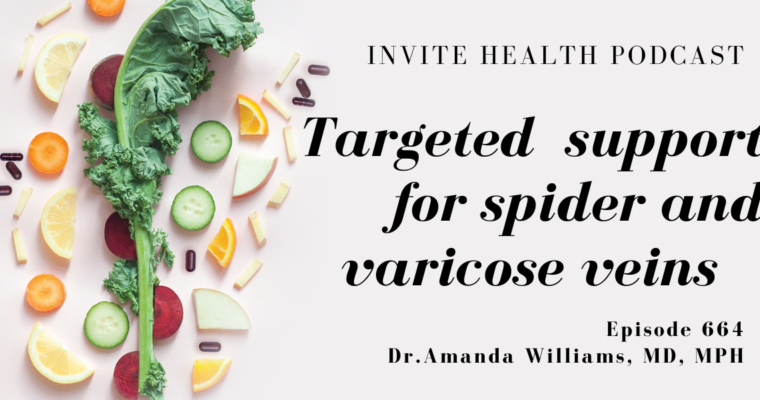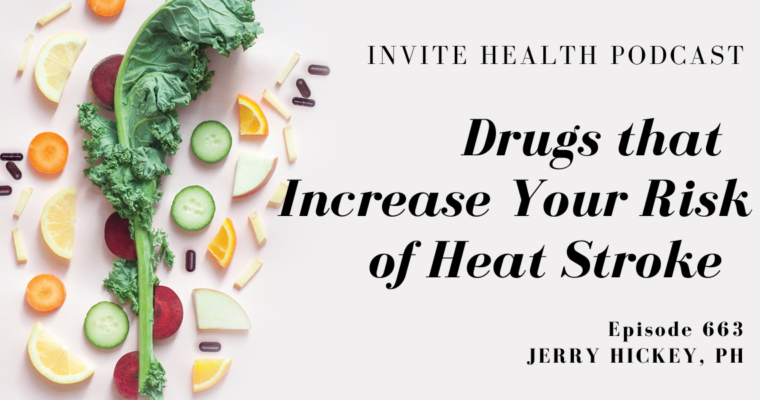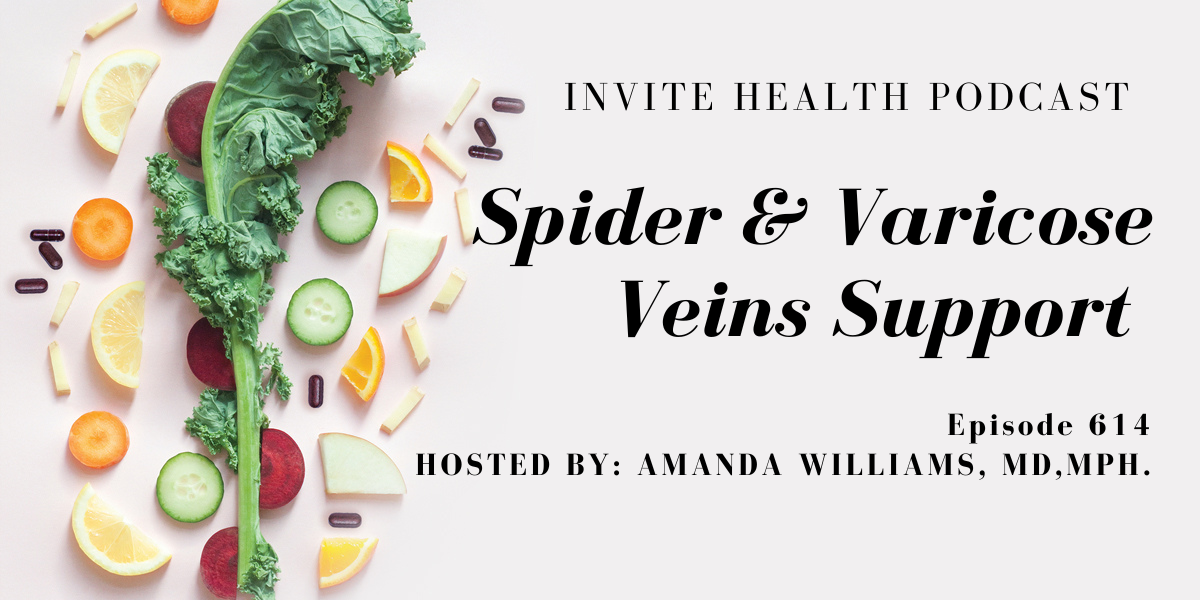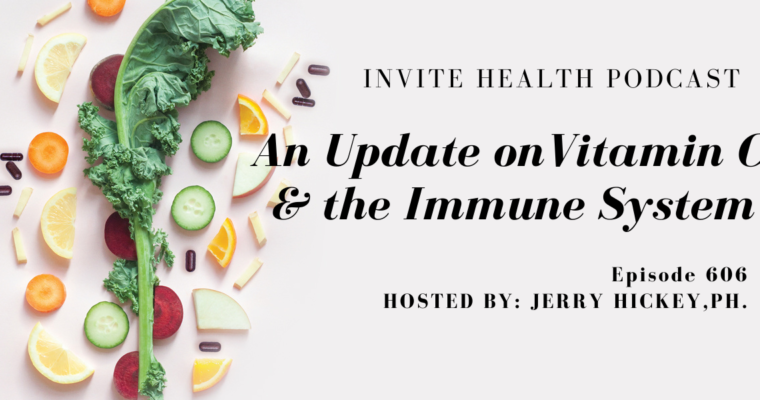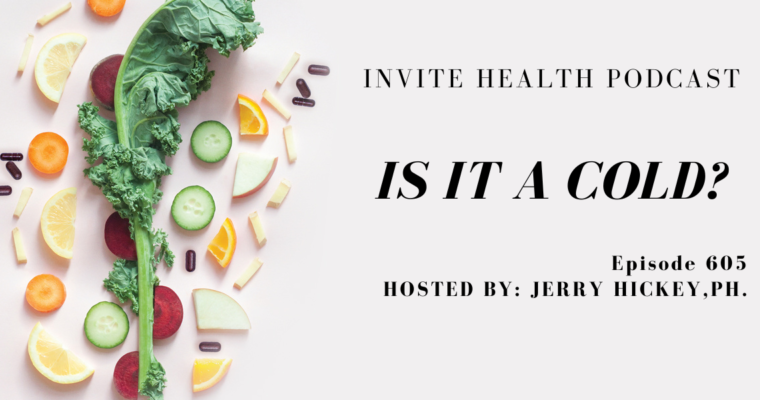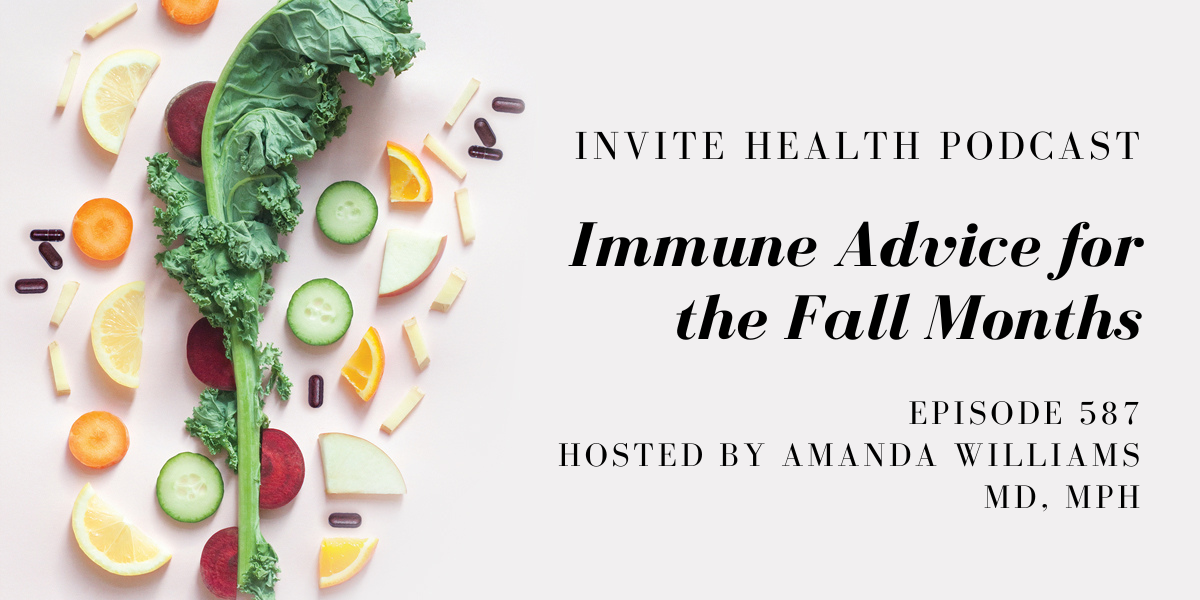Please see below for a complete transcript of this episode.
SPIDER & VARICOSE VEINS SUPPORT, INVITE HEALTH PODCAST, EPISODE 614
Hosted by Amanda Williams, MD, MPH.

*Intro Music*
InViteⓇ Health Podcast Intro: [00:00:04] Welcome to the InViteⓇ Health Podcast where our degreed health care professionals are excited to offer you the most important health and wellness information you need to make informed choices about your health. You can learn more about the products discussed in each of these episodes and all that Invite Health has to offer at www.invitehealth.com/podcast. First time customers can use promo code podcast at checkout for an additional 15% off your first purchase. Let’s get started.† [00:00:34]
*Intro Music*
Amanda Williams MD, MPH: [00:00:40] Do you ever feel like your legs feel incredibly heavy? Or maybe they’re achy? Perhaps you have some tingling or swelling or just generalized pain within your legs? This can be an indication that your vascular system needs some additional support. Maybe you have some of those unsightly veins that we usually call varicose veins or spider veins that seem to really bother you. Maybe they’re just a burden to look at, but they could also be a burden in terms of how you feel. So I want to talk today about some different nutrients that can be very beneficial for supporting the structural integrity of our vascular system as we get older. And we know that this is a big problem for so many folks. So I want to talk in some detail about chronic venous insufficiency and varicose veins. I am Dr. Amanda Williams, scientific director at Invite Health. And when it comes to chronic venous insufficiency, this is a major issue. We know that it’s estimated that roughly about 15% of men in the United States, as well as about 25% of women experience to some degree chronic venous insufficiency in understanding that chronic venous insufficiency is a indication that the cardiovascular system is struggling, is the best word to use. And when we have chronic venous insufficiency and if we are not doing the right things in terms of the management of that, that can only lead down a path of worsening of the the symptoms. And certainly that can become incredibly debilitating for many folks. So I’ve talked to many individuals throughout the years who, you know, maybe they come in and they say, oh, I have these, you know, spider veins, I/ve never had them before in the past or I have these varicose veins and they can be incredibly painful. Or perhaps you’ve been to your doctor and they’ve told you that you have chronic venous insufficiency. We know that there are different lifestyle modifications that we can be turning to, to try to improve the structural integrity of our vascular system, including adherence to a Mediterranean style way of eating, because those high antioxidant foods, those powerful polyphenols and flavonoids can do so much with the incorporation of their antioxidant properties, but also with vitamin C. So first, we always have to start with diet, but we also have to look at the other lifestyle modifications, including, you know, trying to avoid being sedentary, this is a major issue. We know that physical activity certainly encourages the return of venous blood from the legs back to the heart. And through that action, this will continue to allow the valve system within the lower extremities to work more efficiently and effectively for you. So if you have a job where perhaps you, you know, are sitting throughout the entire day, this is why you want to be able to get up on a regular basis and be able to move. So getting up every 2 to 3 hours is really incredibly advantageous. This is always the recommendation for people who are also flying. If you have a flight that’s lasting any more than 2 to 3 hours, you always want to get up and move. And the reason for that is you don’t want to run the risk of developing a deep vein thrombosis or a DVT. Another little trick that you can do, say, if you’re sitting down, maybe you’re watching TV or, you know, sitting at work, is to flex your ankles, you know, moving your ankles back and forth, kind of drawing up upon the foot, avoiding crossing your legs when you’re sitting, and this is a major habit that many folks have. But we know that this can lead to the further degradation of our vascular system.† [00:04:33]
[00:04:35] So these are all, you know, lifestyle modifications, being more active, moving, getting that blood pumping. Of course, the adherence to a healthier diet and including in those high antioxidant fruits and vegetables would be incredibly advantageous. But we also know that we can be taking different supplements and we have a wonderful formulation called Circu Support, and this is a combination of Diosmin, Hesperidin and a citrus bioflavonoid complex. So it’s incredibly potent when it comes to how it is working within the lining of those vessels, including the tiny little capillaries. So when someone’s dealing with spider veins, for example, you get that small little breakage right under the surface of the skin, those spider veins. That is due to the breakdown of the structural strength of the capillaries. So we want to make sure that we can support those capillaries and we can see through the scientific research over the course of many decades that both Diosmin and Hesperidin have been shown to be highly effective. We can also look at Butcher’s Broom as well, which is also included in this formulation, which is called Circu Support, and Butcher’s broom itself has been studied in the treatment of chronic venous insufficiency in peripheral artery disease because of the high amount of antioxidant constituents that are naturally occurring within the butcher’s broom itself.† [00:06:06]
ICYMI:LOWERING THE RISK OF CARDIAC ARREST, PART 1, INVITE HEALTH PODCAST, EPISODE 612.>>LISTEN NOW!
[00:06:07] We can look at horse chestnut, this is also very, very beneficial. This is in our Veins hx formulations. So the veins contains the horse chestnut along with powerful citrus bile flavonoids to help once again that structural integrity of the vascular system. These are all key when it comes to maintaining the structural components within the vascular system. So just to to talk a little bit about Diosmin, in the Journal of Molecules, they looked at the effect of Diosmin administration in patients who have chronic venous insufficiency. Remember, if you got 10 to 15% of men who develop chronic venous insufficiency and a good 25% of women, we know that this is a major problem. So Diosmin, being a natural compound with very powerful biological activities can help to support lymphatic drainage. They’ve been able to show how it supports microcirculation as well as increases the venous tone also known as the structural integrity of the vascular system, we want to maintain that elasticity. And so looking at how it is that the Diosmin is actually working, they found a clinical significant difference in those who were taking diosmin compared to placebo when it comes to maintaining the health of the entire vascular system. One of the ways it’s also working is through the reduction of inflammatory markers in the body. So if we have a lot of inflammation, this can lead to further destruction of the vessel lining themselves. So it’s a highly impressive study that really emphasize once again that Diosmin has these powerful mechanisms to really help to support the reversal in terms of the pathophysiology, and even with the edema, the swelling that can occur within the, the lower extremities.† [00:08:12]
[00:08:13] Now, there was another study also looking at the impact of diosmin, in improving the symptoms. When I mentioned, you know, heavy legs, cramping of the legs, pain when you’re walking, for example, for those who have varicose veins, oftentimes they’ll complain about a lot of the pain within those vessels. And they found that, the improvement of those symptoms, as well as the overall improvement of quality of life in patients who have chronic venous insufficiency, was very high in the group once again, who was taking the diosmin. So we, you know, revert back, we look at this Circu Support formulation, we say, okay, well this is combining Diosmin with hesperidin, and that citrus bile flavonoid complex and the power of Butcher’s Broom extract. So this is one formulation that we can turn to. The other one is the Veins Hx, which contains Horse Chestnut. Horse Chestnut we know, is native to northern Greece and it’s coming from a tree and produces fruits. We have seen the benefits when it comes to horse chestnut supplementation for targeting chronic venous insufficiency and varicose veins and hemorrhoids, for example. So I will oftentimes advise the Veins Hx formulation for those who are dealing with these conditions. A lot of folks, you know, struggle with hemorrhoids and they can be incredibly problematic. So through the utilization of Veins Hx, this can be a wonderful support system for you when it comes to a supplement to add to your daily routine for acute issues with hemorrhoids, say you have an active hemorrhoid and perhaps it’s bleeding, you’d want to use two tablets twice a day, for maintenance, just try to keep that at bay, 1 to 2 tablets per day is certainly advantageous. Also in the setting, if you know someone you know, if you have a sprain, you step off the the sidewalk a little funny and you have any type of injury, the Veins Hx along with that Circu support really can help with the healing process itself because when it comes to a significant sprain, for example, we want to make sure that the vascular system is highly supported. We know that these different nutrients can certainly target the inflammatory process as well. So the Veins hx, as well as the Circu support, are kind of the number one go to formulations that we want to be looking at when dealing with any type of a vascular issue. So whether you have peripheral artery disease or chronic venous insufficiency, those spider veins or even varicose veins, these are the two nutrients that you definitely want to have on board in addition to having, you know, every day supplementing with vitamin C, at least about 2000 milligrams daily would be incredibly advantageous to give you that comprehensive support.† [00:11:15]
WHAT YOU NEED TO KNOW ABOUT SWOLLEN LEGS – INVITE HEALTH PODCAST, EPISODE 560>>LISTEN NOW
[00:11:16] So I just wanted to give you a little overview of what we can do if we are dealing with those unsightly varicose veins or if we are dealing with that heaviness or the achiness within the legs. Want to get up, you want to get moving, you want to make sure that your foods are helping, not hurting your situation. And of course, we can include in the Circu support formulation as well as Veins Hx. So that’s all that I have for you for today, I want to thank you so much for tuning in to the InVite Health podcast. Remember, you can find all of our episodes for free wherever you listen to podcasts or by visiting invitehealth.com/podcast. Do make sure that you subscribe and you leave us a review. You can follow us on Facebook, Twitter and Instagram, and we will see you next time for another episode of the InViteⓇ Health Podcast.† [00:11:16]
*Exit Music*


